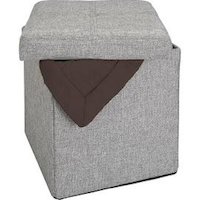Apartment Stash
Food is one of the most pressing concerns in a survival situation. If the unthinkable should happen, you will want to have a stash of food on hand to get you through till society begins to function again. This is as important– or more so– for apartment dwellers as it is for people with rambling estates. Fortunately, it’s possible to keep a cache of edibles and water in minimal amount of space, providing you know a few handy tips:
How to keep your stash
It’s feasible to store an emergency food supply in a small dwelling without letting the food dominate the space. But before considering how to camouflage your stash, be sure that the food is stored so that it will be edible when you need it.
Keep food in a cold, dark place to maintain freshness and nutrition. Heat and light are the two arch nemeses of long term storage. Avoid them. The best storage temperature for most foods is around 50 to 60 degree F. Also, store food in a way that minimizes germs and oxidation. Sealed containers kept in cool, dark places should stop these spoilers.
Since heat rises, it is preferable to store food near the ground, in a basement if you have one instead of an attic. This also works on a smaller scale—it is better to keep perishables on the floor of a closet rather than the top shelf. Weight is another reason to keep foods near the ground. You may be storing them for a long time and you don’t want shelves to break. Also, in the event of an earthquake, it is a bad idea to have heavy objects stored high up.
Store food in containers that discourage bugs and rodents. Canned goods are best because they are almost impossible for pests to penetrate and because the food in them has already been cooked and should be edible straight from the can for a very long time. Sealed plastic containers will also work as long as the seal remains in tact. For discouraging pests, the name of the game is eliminating odors. Burlap or paper bags don’t do this and so they should not be used for long term storage.
Where to keep your stash
If you’re like us, you probably don’t want to put up a fake wall or start ripping up floorboards. Don’t worry, there are other options.

For most people, the most convenient place is under the bed. If that’s full, look to your closet floors. You may want to purchase a shoe rack or other organizer to make room for storage bins or stacks of cans in your closet. A third painless storage area is behind a couch. Move the furniture away from the wall a few feet and stack the bins neatly out of sight.
For more extensive storage, consider filling large Rubbermaid containers with food and making them into rough furniture. A Rubbermaid bin with a quilt thrown over the top can make a fine sofa for a kid’s bedroom, just be the kids don’t get into the food and cause it to spoil. Or one of those footstool ottomans can store days of food and water. Spread it around the apartment so it’s not a big eyesore.
In general, it’s a bad idea to bury food if you don’t own your own property. It can be very difficult to locate, especially if catastrophic conditions have altered the landscape or moved landmarks. Also, buried foods are difficult to maintain: cans that aren’t rotated may rust and can shift and leak.
What to Store
The basics are the same whether you live in a huge manor house in the country or in a tiny apartment on the twelfth floor of a high-rise: grains, legumes, dehydrated milk, sugar, salt, oil, and garden seeds can sustain life. Tend to these essentials first and then add cans of tasteful and nutritious foods. Also, store some quality-of-life foods such as desserts or favorite junk foods. It may seem frivolous, but it’s not. Attitude is a central issue in an emergency, and comfort foods go a long way to normalize the situation.
Remember to occasionally check your stock for leaks or rust. Check the expiration dates. It’s vital that this food be edible for you, so keep on hand the necessary implements such as condiments, grinders, utensils and can-openers. Practice cooking your stored foods to make sure you know how and rotate out foods that have been stored for sometime.